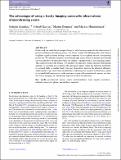The advantages of using a Lucky Imaging camera for observations of microlensing events
Abstract
In this work, we study the advantages of using a Lucky Imaging camera for the observations of potential planetary microlensing events. Our aimis to reduce the blending effect and enhance exoplanet signals in binary lensing systems composed of an exoplanet and the corresponding parent star. We simulate planetary microlensing light curves based on present microlensing surveys and follow-up telescopes where one of them is equipped with a Lucky imaging camera. This camera is used at the Danish1.54-m follow-up telescope. Using a specific observational strategy, Foran Earth-mass planet in the resonance regime, where the detection probability in crowded-fields is smaller, lucky imaging observations improve the detection efficiency which reaches 2 per cent. Given the difficulty of detecting the signal of an Earth-mass planet incrowded-field imaging even in the resonance regime with conventional cameras, we show that Lucky Imaging can substantially improve the detection efficiency.
Citation
Sajadian , S , Rahvar , S , Dominik , M & Hundertmark , M 2016 , ' The advantages of using a Lucky Imaging camera for observations of microlensing events ' , Monthly Notices of the Royal Astronomical Society , vol. 458 , pp. 3248-3259 . https://doi.org/10.1093/mnras/stw526
Publication
Monthly Notices of the Royal Astronomical Society
Status
Peer reviewed
ISSN
0035-8711Type
Journal article
Description
Works by SS and SR were supported by the grant 94017434 from the Iran National Science Foundation (INSF).Collections
Items in the St Andrews Research Repository are protected by copyright, with all rights reserved, unless otherwise indicated.

